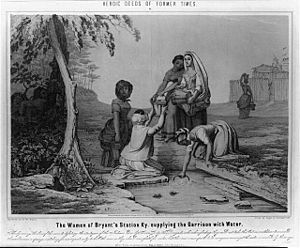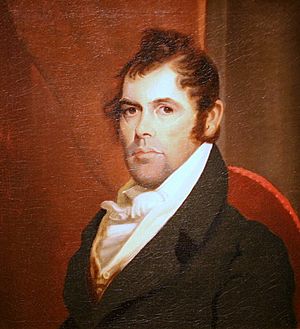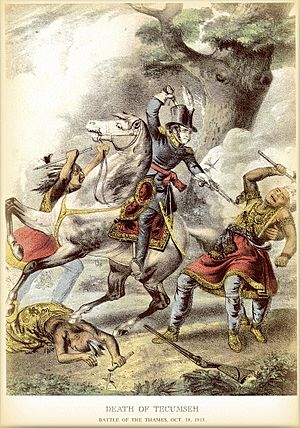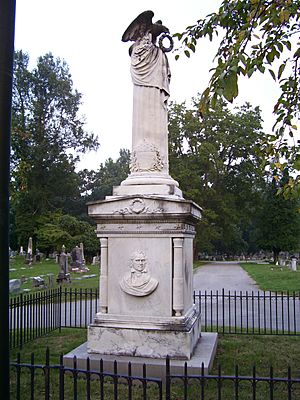Richard Mentor Johnson facts for kids
Quick facts for kids
Richard Mentor Johnson
|
|
|---|---|
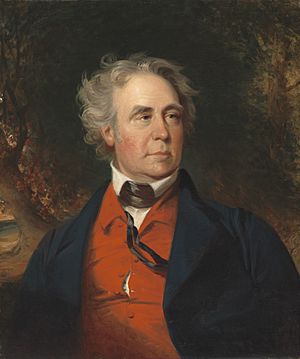
Portrait by John Neagle, c. 1843
|
|
| 9th Vice President of the United States | |
| In office March 4, 1837 – March 4, 1841 |
|
| President | Martin Van Buren |
| Preceded by | Martin Van Buren |
| Succeeded by | John Tyler |
| United States Senator from Kentucky |
|
| In office December 10, 1819 – March 3, 1829 |
|
| Preceded by | John J. Crittenden |
| Succeeded by | George M. Bibb |
| Member of the U.S. House of Representatives from Kentucky |
|
| In office March 4, 1829 – March 3, 1837 |
|
| Preceded by | Robert L. McHatton |
| Succeeded by | William W. Southgate |
| Constituency | 13th district (1833–1837) 5th district (1829–1833) |
| In office March 4, 1807 – March 3, 1819 |
|
| Preceded by | Thomas Sandford |
| Succeeded by | William Brown |
| Constituency | 4th district (1807–1813) 3rd district (1813–1819) |
| Member of the Kentucky House of Representatives |
|
| In office November 5, 1850 – November 19, 1850 |
|
| In office November 6, 1804 – November 4, 1806 |
|
| Personal details | |
| Born | October 17, 1780 Beargrass, Virginia (present-day Louisville, Kentucky), U.S. |
| Died | November 19, 1850 (aged 70) Frankfort, Kentucky, U.S. |
| Resting place | Frankfort Cemetery 38°11′52.2″N 84°52′01.8″W / 38.197833°N 84.867167°W |
| Political party | Democratic-Republican (before 1828) Democratic (after 1828) |
| Spouse | Julia Chinn (1790–1833) (common law marriage) |
| Children | 2 |
| Relatives | Conway-Johnson family |
| Education | Transylvania University |
| Signature | |
| Military service | |
| Allegiance | United States |
| Branch/service | United States Volunteers |
| Years of service | 1812–1814 |
| Rank | Colonel |
| Battles/wars | |
Richard Mentor Johnson (October 17, 1780 – November 19, 1850) was an American lawyer, military officer, and politician. He served as the ninth Vice President of the United States from 1837 to 1841 under President Martin Van Buren. He is the only vice president ever elected by the United States Senate. Johnson also represented Kentucky in both the U.S. House of Representatives and the Senate. He started and ended his political career in the Kentucky House of Representatives.
Contents
Early Life and Education
Richard Mentor Johnson was born on October 17, 1780, in Beargrass, Kentucky. This area is now part of Louisville. He was the fifth of Robert and Jemima Johnson's eleven children. His father, Robert Johnson, was a surveyor who bought land in Kentucky. His mother, Jemima Suggett, came from a wealthy family.
Around the time Richard was born, his family moved to Bryan's Station. This was a fortified outpost near what is now Lexington. It was a dangerous time due to Native American resistance to new settlements. Jemima Johnson was remembered for her bravery during an attack in 1782. She reportedly led women to a spring to get water, which helped the settlers defend the fort.
By 1783, Kentucky became safer, and families began to build farms outside the forts. The Johnsons settled on land Robert had bought at Great Crossing. Robert became successful by choosing good land and taking advantage of large land grants.
Richard was described as a happy child. He lived on the family farm until he was 16. In 1796, he attended a local grammar school. Then he went to Transylvania University, the first college west of the Appalachian Mountains. While there, he studied law with George Nicholas and James Brown.
Career Beginnings
Johnson became a lawyer in Kentucky in 1802. He opened his law office in Great Crossing. He also owned a retail store and started other businesses with his brothers. Johnson often helped poor people with their legal cases for free. He also welcomed disabled veterans, widows, and orphans into his home.
Family Life
Richard Johnson had a long-term relationship with Julia Chinn. She was a mixed-race woman who had grown up in his family's household. They had two daughters together, Adaline and Imogene. Johnson treated Julia as his partner, which was allowed in Kentucky at the time. He acknowledged their daughters and gave them his last name.
When Johnson was away, Julia managed his plantation and business affairs. She passed away in 1833 during a widespread illness. Johnson was very sad about her loss. He made sure his daughters received an education and later gave them large farms when they married.
Political Career
Early Years in Congress
After becoming a lawyer, Johnson returned to Great Crossing. His father gave him a plantation. He became successful through his law practice and farming.
In 1804, Johnson was elected to the Kentucky House of Representatives. He was the first person born in Kentucky to serve in the state's legislature. He worked to protect small farmers. He also tried to limit the power of federal courts, which he thought were not democratic enough.
In 1806, Johnson was elected to the United States House of Representatives. He was the first native Kentuckian to be elected to Congress. He served six terms in a row. He supported President Thomas Jefferson and President James Madison. Johnson believed their party, the Democratic-Republicans, acted in the country's best interest.
Johnson supported the Embargo Act of 1807, which stopped trade with other countries. He preferred this economic approach over war. Later, he supported replacing it with the Non-Intercourse Act.
Johnson was known as a "War Hawk." These young politicians wanted the nation to grow. He was careful about going to war at first. But by late 1811, he supported the War of 1812 against Britain. He voted for the declaration of war in June 1812.
War of 1812 Hero
Joining the Fight
Soon after war was declared, Johnson encouraged raising troops in the western states. He returned to Kentucky to recruit volunteers. He formed a group of mounted riflemen, choosing only men with horses. He became their colonel. His forces joined General William Henry Harrison's army.
Johnson's men helped save Fort Wayne from an Indian attack in September 1812. They then returned to Kentucky, burning some Native American villages on the way.
New Tactics
Back in Congress, Johnson suggested a new way to fight Native American forces. He proposed using mounted riflemen who could move quickly. They would attack villages in winter to force a decisive battle. This plan was approved, and Johnson used these tactics in the summer of 1813.
Johnson raised a thousand men. He made sure they were well-armed and even hired gunsmiths and doctors himself. He developed a new fighting system for his men. Between May and September, Johnson's forces raided Native American villages, destroying their supplies.
Battle of the Thames
In September, the British fleet was defeated at the Battle of Lake Erie. This made the British army vulnerable. The British, led by General Henry Procter, retreated. Johnson's cavalry helped pursue them. On October 5, Procter decided to fight at the Battle of the Thames.
Johnson's forces attacked first. His brother, James Johnson, fought the British soldiers. Richard Johnson, with a smaller group, attacked the Native American forces led by Tecumseh. The fighting was tough, but Johnson's attack eventually broke the Native American lines. During this battle, Tecumseh was killed.
For many years, people debated who killed Tecumseh. Johnson himself said he killed "a tall, good-looking Indian." In 1818, Congress honored Johnson with a sword for his "daring and distinguished valor" at the Battle of the Thames. He was one of only 14 officers to receive such an honor before the American Civil War.
Recovery and Return to Washington
After the battle, Johnson was wounded and returned home to Kentucky. It took him five months to recover. He was left with a damaged arm and a limp for the rest of his life. He returned to Congress in February 1814, receiving a hero's welcome.
When British forces burned Washington, D.C., in August 1814, Johnson led a committee to investigate. However, the war ended before the debate could happen.
Post-War Congressional Work
After the war, Johnson focused on helping veterans. He worked to get pensions for widows and orphans. He also tried to help settlers buy land in the West more easily. He believed the US should expand across the continent.
Johnson also worked to abolish imprisonment for debt at the federal level. This meant people would not be jailed just because they owed money. He introduced this idea every year until it passed in 1832. This helped lead to the end of debt imprisonment in most states within ten years.
Johnson was also known for his support of the Choctaw Academy. This school, located on his farm, educated Native American children. He believed it was a way to promote peace and expansion.
Senate Years
Johnson became a U.S. Senator in 1819. He was involved in debates about admitting new states like Missouri and Maine. He voted to prevent slavery in new territories north and west of Missouri.
In 1828, Johnson lost his bid for re-election to the Senate. This was partly due to his relationship with Julia Chinn. While people in his home district didn't seem to mind, some slaveholders in other parts of Kentucky were not happy. Johnson's supporters withdrew his name, and another candidate was chosen.
Return to the House and Vice Presidential Bid
After leaving the Senate, Johnson returned to the House of Representatives in 1829. He continued to chair committees, including the one dealing with mail delivery. He famously argued against stopping mail delivery on Sundays. He believed government should not legislate religious practices.
Johnson became a strong supporter of Andrew Jackson. After the 1824 election, which Jackson lost despite winning the popular vote, Johnson promised to oppose the new administration. He joined the group that later became the Democratic Party, which supported Jackson.
In 1836, Johnson ran for Vice President with Martin Van Buren. His campaign slogan was "Rumpsey Dumpsey, Rumpsey Dumpsey, Colonel Johnson killed Tecumseh." He was a war hero, which Jackson hoped would balance the ticket. However, Johnson did not get enough electoral votes to win directly. For the only time in U.S. history, the Senate had to choose the Vice President. Johnson was elected by a vote of 36 to 16.
Vice Presidency (1837–1841)
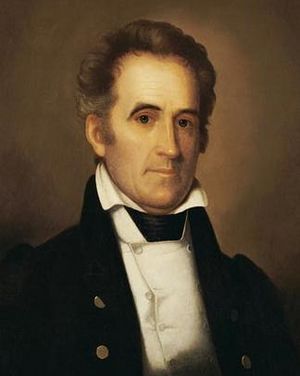
Johnson served as Vice President from 1837 to 1841. His time in office was not very eventful, and he didn't have much influence with President Van Buren. He did cast a tie-breaking vote in the Senate fourteen times.
After a financial crisis in 1837, Johnson took a long break. He went back to Kentucky and opened a tavern and spa on his farm. He was known for wearing a bright red vest and tie during this time.
In 1840, Johnson ran for Vice President again. However, many in his party felt he was a problem for the ticket. The Democratic Party decided not to nominate anyone for Vice President, hoping states would choose their own candidates. Johnson still campaigned, but his speeches were sometimes unclear. He even showed his war wounds to crowds. He lost the election, receiving only 48 electoral votes.
Later Life and Legacy
After his term as Vice President, Johnson returned to Kentucky. He continued to manage his farm and tavern. He was elected to the Kentucky House of Representatives again from 1841 to 1843. He also ran unsuccessfully for the U.S. Senate and for Governor of Kentucky.
In 1850, Johnson was elected to the Kentucky House of Representatives one last time. However, his health was failing. He passed away from a stroke on November 19, 1850, just two weeks into his term. He was 70 years old. He was buried in the Frankfort Cemetery in Frankfort, Kentucky.
Several counties in the U.S. are named after Richard Mentor Johnson. These include counties in Illinois, Kentucky, Missouri, and Nebraska.
Johnson's political success led to other family members entering politics. His brothers, James and John Telemachus Johnson, and his nephew, Robert Ward Johnson, all served in the House of Representatives.
See also
 In Spanish: Richard Mentor Johnson para niños
In Spanish: Richard Mentor Johnson para niños
- List of people from Kentucky
 | DeHart Hubbard |
 | Wilma Rudolph |
 | Jesse Owens |
 | Jackie Joyner-Kersee |
 | Major Taylor |


